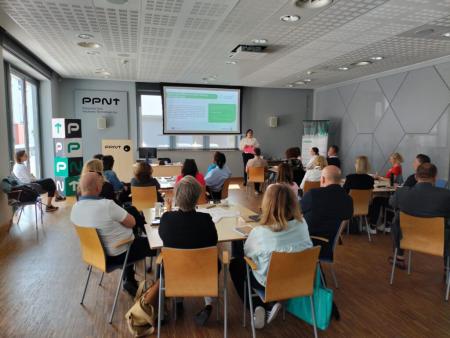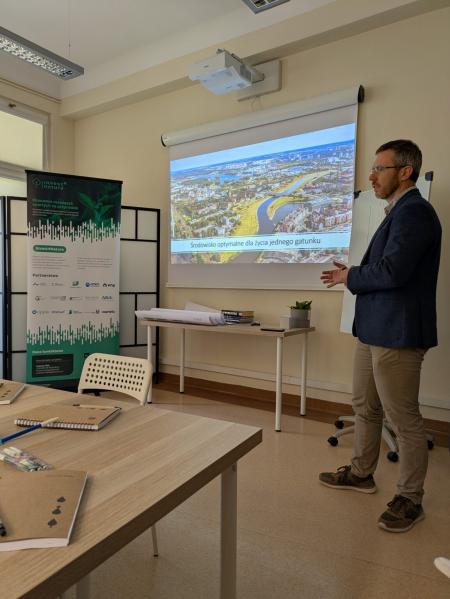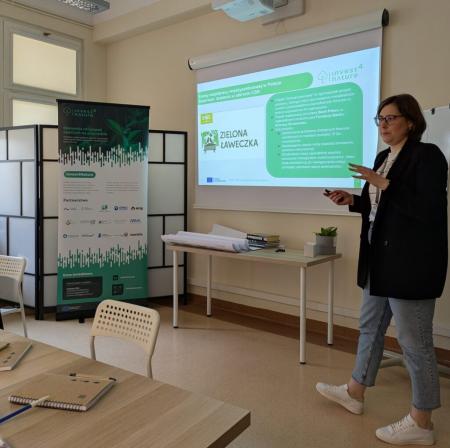
As the demand for green investments grows, Poznań is looking for new ways to finance sustainable projects. With most funding still coming from the public sector, the city recognizes the need to involve private partners more actively. By participating in the Invest4Nature project, Poznań is taking important steps to unlock the potential of public-private cooperation and accelerate the city’s green transition.
To support green urban investments in Poznan, it is important to strengthen the cooperation models between the public and private sectors. A key milestones on this path was a two-day cross-sectoral workshop held by Poznań City Hall on June 10–11.
The two days of the workshop had a two-pronged approach of addressing both the private sector on day 1 and the public sector on day 2.
Day One: Private Sector

Tackling the current state of cooperation and understanding public sector expectations
Lecturer Agnieszka Dziubała from Interdisciplinary Projects in Project Coordination and Urban Regeneration Office, Poznań City Hall. Credits: Małgorzata Bronikowska, City of Poznań.
The first day of the workshop deserves special attention. Its agenda was co-created by the Invest4Nature team at Poznań City Hall and the Poznań Science and Technology Park – a key partner in engaging the private sector. Ahead of the event, they conducted a survey among 23 entities, including 19 businesses, to better understand the current state of collaboration between the private sector and local government.
The workshops brought together 12 representatives from companies and 24 officials from Poznań City Hall. The first session featured a presentation of survey results, a lecture on the study “ESG in SMEs: Between Awareness and Action” by Wrocław University of Science and Technology and an overview of Poznań City Hall’s Nature-based Solutions initiatives, complemented by best practice examples from Kompania Piwowarska.The presentations were followed by group work, where five teams used a Customer Journey Map tool to explore five potential sustainable project ideas. These touched on the NbS theme but also included related topics such as CSR. The overall analysis identified a set of conclusions outlining the next steps for Poznań City Hall:
- Enhance information and communication: a clear knowledge source and a dedicated project steward (a one-stop shop) are needed to encourage cooperation with companies.
- Simplify procedures: complicated, time-consuming processes and multi-stage decision-making discourage private partners. Unnecessary bureaucracy must be reduced, and regulations clarified.
- Enhance incentive system: Developing company promotion and improving corporate image emerged as important motivators. Entrepreneurs need clear guidelines to effectively showcase their pro-environmental contributions.
- Nature of the relationship between the sectors: Companies are willing to invest time and resources when they are confident that cooperation will continue in future projects. From the private sector, long-term relationships with the public sector are essential.
- Innovation and participation: Businesses are open to testing new solutions and sharing knowledge, while the public sector requires accessible specialist expertise. This exchange benefits both sectors.
- Purchasing criteria legislation: The responsibility for the development of legislation lies entirely within the public sector, but the expectation comes from the private sector.Current procurement processes often focus solely on price, favoring cheaper offers over sustainable, long-term solutions. Pro-environmental criteria, eco-labels, experience and quality need to be measurably evaluated in procurement, so they can be considered alongside price.
Addressing Challenges: A Public Sector Perspective from Day Two
Exploring key barriers and opportunities for improved collaboration models

Lecturer Małgorzata Bronikowska from Interdisciplinary Projects in Project Coordination and Urban Regeneration Office, Poznań City Hall. Credits: Agnieszka Dziubała, City of Poznań.
On the second day, 22 public sector participants representing various city departments built on the findings from the first day. Their focus was to identify intersectoral challenges and barriers that need to be addressed to strengthen public-private collaboration.
Following opening lectures on Poznań City Hall’s Nature-based Solutions initiatives and Urban Biodiversity, the group engaged in an interactive working session. Participants were invited to identify, discuss and prioritize key issues across three thematic areas:
Green Procurement Planning, where participants focused on environmental criteria, needs analysis, existing barriers, and potential incentives for the SME sector.
Corporate Social Responsibility (CSR), including current initiatives, opportunities for further implementation, and obstacles encountered.
Sponsorship Packages. Groups explored the possibilities of introducing sponsorship models within Poznań City Hall.
Lecturer Dr. Eng. Tomasz Zgoła. Credits: Małgorzata Bronikowska, City of Poznań.
The task canvas for group work: How to Design Public Procurement Processes That Are Friendly to Small and Medium-Sized Enterprises Credits: Agnieszka Dziubala, City of Poznań.
The conclusions from the second day offer the public sector a set of practical directions for improving cooperation with private partners:
- Prioritise gaining a genuine understanding of companies’ real-life experiences at various stages of collaboration and to recognize the barriers faced by the private sector.
- Identify formal, procedural, organizational and communication obstacles, especially when aiming to encourage private involvement in procurement or green investments.
- Explore design of cooperation models and incentive systems—whether organizational, financial or reputational—that can help foster private sector engagement.
- Finally, address the existing gap in CSR-related knowledge and experience within Poznań City Hall
Turning Potential into Action: What’s Next for Poznań?

Lecturer Agnieszka Dziubała from Interdisciplinary Projects in Project Coordination and Urban Regeneration Office, Poznań City Hall. Credits: Małgorzata Bronikowska, City of Poznań.
The workshops provided valuable insights into how the public and private sectors view and approach collaboration. Listening closely to the private sector’s needs, expectations and challenges was a key step in shaping the city’s green transition. These two days marked a meaningful milestone in Poznań’s ongoing journey toward sustainable urban development.
Now, the Invest4Nature team at City Hall is working on specific recommendations based on the workshops’ outcomes. The next step is to select the most impactful actions and begin their implementation.
Poznań is continuing to refine its strategic direction on a broader scale, with significant support and guidance from the Invest4Nature project. In April 2025, additional workshops with Horizon Nua were held, aiming to develop two key documents: the Poznań Finance Action Plan and the Poznań Nature-based Enterprises Action Plan, both expected to be finalized by June 2026. Together, these plans and the recommendations from the workshops will pave the way for stronger public-private cooperation and greater private sector involvement in green investments in Poznań.
Author: Małgorzata Bronikowska and Poznań I4N Team, Poznań City Hall, Project Coordination and Urban Regeneration Office